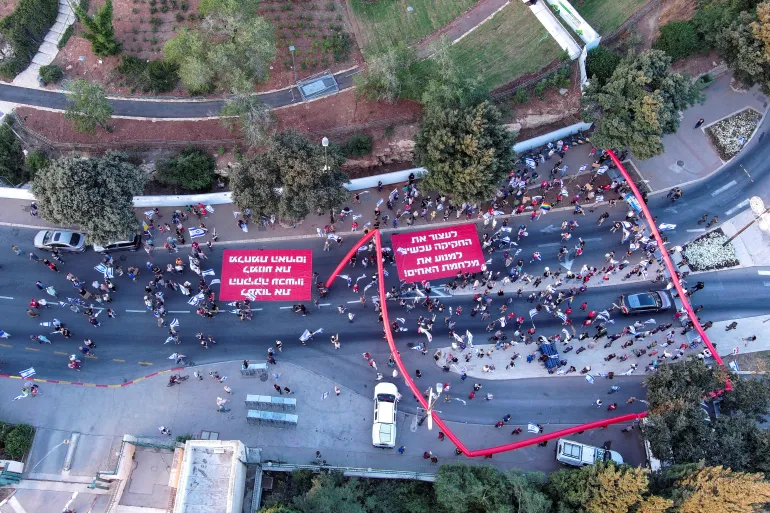Description

Disclaimer: Copyright infringement not intended.
Context
Israel's parliament, the Knesset, approves a bill that aims to limit the oversight powers of the Supreme Court.
Details
- Israel's parliament, the Knesset, has given initial approval to a bill limiting the oversight powers of the Supreme Court.
- The vote resulted in a 64 to 56 majority in favor of the limits, with Prime Minister Benjamin Netanyahu's far-right governing coalition overpowering the opposition.
- Anti-government protesters were forcibly removed from the building ahead of the vote, leading to a police complaint against them.
Background
- The bill is part of a controversial judicial overhaul initiated by Netanyahu's government.
- Opposition groups have raised concerns about the erosion of checks and balances within the government system.
- Months of demonstrations and a political crisis have ensued due to the opposition movement against Netanyahu's attempt to weaken the judiciary.
Protesters and Security Measures
- Anti-government protesters were forcibly dragged out of the building by parliament security.
- A police complaint was filed against the demonstrators for allegedly seeking to harm public order and the democratic process.
- The opposition movement against Netanyahu's judicial reforms led to widespread protests and heightened tensions.
Approval Process
- The bill still needs to pass two more votes before becoming law.
- Netanyahu's far-right governing coalition, with 64 seats in the parliament, appears likely to succeed in passing the bill.
- Protests are expected to intensify if the bill passes further votes.
Bill's Objectives
- The proposed bill aims to limit the Supreme Court's power to void decisions made by the government, ministers, and elected officials by ruling them unreasonable.
- Critics argue that such a law can lead to corruption and abuses of power.
- Proponents claim it will facilitate effective governance by reducing court intervention.
Reactions and Concerns
- Netanyahu released a video statement defending the bill, claiming that it strengthens democracy without harming court independence and civil rights.
- Opponents remain unconvinced and continue to voice their concerns.
- The sound of protesters rallying outside the Supreme Court could be heard nearby, with economic concerns being raised by the governor of the Bank of Israel.
Economic Impact
- The Governor of the Bank of Israel, Amir Yaron, called for broad agreements over judicial reforms to safeguard institutional independence, citing potential economic costs.
- Netanyahu downplayed the economic fallout and expressed impatience with ongoing demonstrations.
Call for Dialogue
- Israel's president, Isaac Herzog, urged the sides to resume talks to address the fundamental issues causing division in Israeli society.
- The collapse of compromise talks in June led to the coalition restarting legislation on judicial reforms.

About Israel
- Located in the Middle East, Israel is a small country with a diverse cultural and historical background.
- It shares borders with Lebanon, Syria, Jordan, Egypt, and the Mediterranean Sea.
- Israel has a population of approximately 9 million people, with Jerusalem as its capital.
Historical Background
- Israel has a rich history, with significant religious and cultural importance for Judaism, Christianity, and Islam.
- The establishment of modern Israel dates back to 1948 when it gained independence following the end of the British Mandate in Palestine.
- The region has been a subject of various conflicts, including the Israeli-Palestinian conflict, Arab-Israeli wars, and ongoing tensions in the region.
Governance and Politics
- Israel operates as a parliamentary democracy with a multi-party system.
- The President serves as the head of state, while the Prime Minister holds executive powers as the head of government.
- The Knesset, Israel's parliament, consists of 120 seats and is responsible for enacting legislation.
Society and Culture
- Israeli society is diverse and reflects a blend of Jewish, Arab, and other ethnic and religious communities.
- Hebrew and Arabic are the official languages, and English is widely spoken.
- Israel is known for its vibrant cultural scene, including music, literature, art, and film.
Economy
- Israel has a developed and technologically advanced economy.
- Key sectors include high-tech industries, agriculture, defense, tourism, and diamond cutting.
- It has a strong emphasis on innovation and entrepreneurship, with many successful startups and technological advancements.
Security and Defense
- Israel faces security challenges due to its geopolitical location and historical conflicts.
- It maintains a strong defense force, including the Israel Defense Forces (IDF) and security agencies to ensure national security.
Religious Significance
- Israel is considered a holy land for Judaism, Christianity, and Islam.
- It is home to religious sites such as the Western Wall, the Church of the Holy Sepulchre, and the Al-Aqsa Mosque.
- Jerusalem, a city with deep religious and historical significance, is a focal point of religious pilgrimage and international attention.
International Relations
- Israel has complex relationships with neighboring countries and the international community.
- It has peace treaties with Egypt and Jordan but faces ongoing challenges with the Palestinian
- Israel maintains alliances and partnerships with various countries, particularly with the United States.
Challenges and Opportunities
- Israel faces ongoing challenges related to security, regional conflicts, and the Israeli-Palestinian peace process.
- The pursuit of a peaceful and sustainable solution, economic development, and social cohesion are among the key priorities for the country.
|
PRACTICE QUESTION
Q) Examine the challenges and opportunities faced by Israel in maintaining national security, fostering peaceful coexistence, and contributing to the global economy.(150 words)
|

https://www.aljazeera.com/news/2023/7/10/protesters-dragged-out-of-israeli-parliament-before-key-vote















